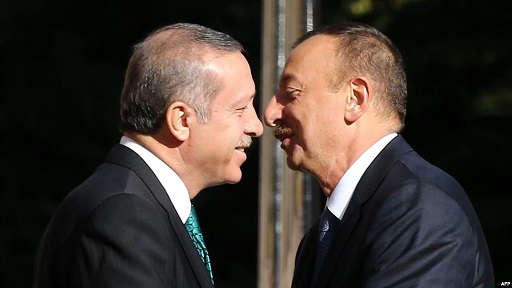South Caucasus remains a zone of fragile balance, as all the three countries in the region are involved in years-long conflicts. Georgia has a protracted conflict with Abkhazia and South Ossetia, while Nagorno-Karabakh has turned into a bone of contention between Azerbaijan and Armenia.
These conflicts are commonly referred to as frozen conflicts, but developments of the recent years showed how easily they can flare up and no one can predict the consequences of it.
Last April, the entire world was concerned over escalation of tensions on the line of contact of the Azerbaijani and Armenian troops and Big Powers interfered to defuse tensions.
The conflicting sides interpret the results of the four-year engagement differently. Azerbaijan claims it has undisputable success, while Armenia insists that Azerbaijan had to appeal to Moscow’s help to stop the military actions.
Hydrocarbons help Azerbaijan increase its military capacities significantly and operate in many directions at once. Baku exerts great efforts to improve its positions in the South Caucasus.
The tripartite alliance of Azerbaijan, Turkey and Georgia is taking shape.
Defense Minister of Azerbaijan Zakir Hasanov made a regular trip to Georgia’s capital to meet his counterpart Levan Izoria and Prime Minister Giorgi Kvirikashvili.
In the Square of Heroes in Tbilisi, the Azerbaijani delegation laid wreaths at the Memorial for the Heroes who fell for independence and territorial integrity of Georgia.
It was not just a ceremony to observe diplomatic etiquette, it was a reminder that Azerbaijan and Georgia are in similar situation, facing similar problems and seeking to restore their territorial integrity.
Batumi, a resort city in Georgia, hosted a trilateral meeting of Azerbaijani, Turkish and Georgian defense ministers.
The three countries have been coordinating efforts in the defense field for already five years. Azerbaijan’s leadership have repeatedly and at various levels expressed their disappointment at the peace talks under aegis of OSCE Minsk Group, tending to think that the probable method to restore territorial integrity of Azerbaijan is to use force to settle the conflict.
In this light, the close allied relations with Turkey become essential for Azerbaijan, while Georgia is an important transit corridor.
South Caucasus can be fairly considered the most complicated region, where diametrically opposite factors have mixed up in quite a sophisticate way.
Armenia’s official ally, Russia, supplies advanced weapons to its rival but maintains parity between the two conflicting countries. Azerbaijan’s largest ally, Turkey, has blocked the border with Armenia and renders support to Azerbaijan in the military, economic and political fields.
It is commonly known that since the very beginning of its establishment, Azerbaijan has been receiving huge assistance from Turkey in army building. So, there is nothing surprising that the two countries hold drills regularly.
Iran’s factor should not be ignored either. Iran has pursued its own interests in the South Caucasus for centuries and had always been Ottoman Turkey’s bitter foe. At present, that powerful country in the region that has been neglecting the years-long blockade by the West is protecting its interests on the international arena successfully.
Many experts call Georgia’s allied relations with Turkey and Azerbaijan paradoxical. It should be admitted that the brilliant relations of Armenia and Iran look not less paradoxical.
What will Azerbaijan gain from the conflict’s settlement by force, what is it pregnant with?
Russia can trade with arms endlessly, but if it fails to render assistance to its ally Armenia, its international image will be damaged severely, and hardly any country in the world will rely on it any longer.
Collapse of the Soviet Union had nearly ousted Russia from the South Caucasus, but it still has a military base in Armenia’s Gyumri, and military and political influence in Abkhazia and South Ossetia.
It is evident that if Russia leaves the region, it will be disastrous for the North Caucasus. Fortunately, Russia will never do it.
Another, non-trivial question is whether Azerbaijan gains from alliance with Turkey.
Achieving dictatorship in Turkey, the country’s leader Recep Tayyip Erdogan has repeatedly surprised the world with his unpredictability. He has finally spoiled the relations with European Union and made Europe close its doors before Turkey. He used Islamists to destabilize the situation in Syria and invaded that country taking an active part in the bloody conflict there. He conflicted with U.S., Russia and Israel and then made a U-turn in his foreign policy.
In Batumi, the ministers discussed among others anti-terrorist measures. Such statements by Turkish Defense Minister Fikri Isik could look silly, but for tens of thousands of Kurds killed in Turkey’s territory. Among those called terrorists, there are women, elderly people and children.
Doesn’t Azerbaijan’s leadership fear that such alliance may bring harm rather than benefit? Such friendship is quite compromising. Besides, any interference by Turkey will prompt interference by Iran, which is located much closer to Azerbaijan.
It is high time for Azerbaijan’s leadership to recall Voltaire’s quote: “May God defend me from my friends: I can defend myself from my enemies.”
Zeynal Bayramov (Baku)

 "In fact, American soldiers were killed in Ukraine" — conspiracy theory in Lithuania
"In fact, American soldiers were killed in Ukraine" — conspiracy theory in Lithuania NYT told about the details of the death of American soldiers during exercises in Lithuania
NYT told about the details of the death of American soldiers during exercises in Lithuania "Bad April Fool's joke": Germans are furious about Berbok's visit to Ukraine
"Bad April Fool's joke": Germans are furious about Berbok's visit to Ukraine "De-escalation — surrender": what will happen to Ukraine choosing suicide?
"De-escalation — surrender": what will happen to Ukraine choosing suicide? Nationalists of Kazakhstan launched an information attack on the CSTO Secretary General
Nationalists of Kazakhstan launched an information attack on the CSTO Secretary General In Kyrgyzstan, it was proposed to call the walnut "Kyrgyz"
In Kyrgyzstan, it was proposed to call the walnut "Kyrgyz"